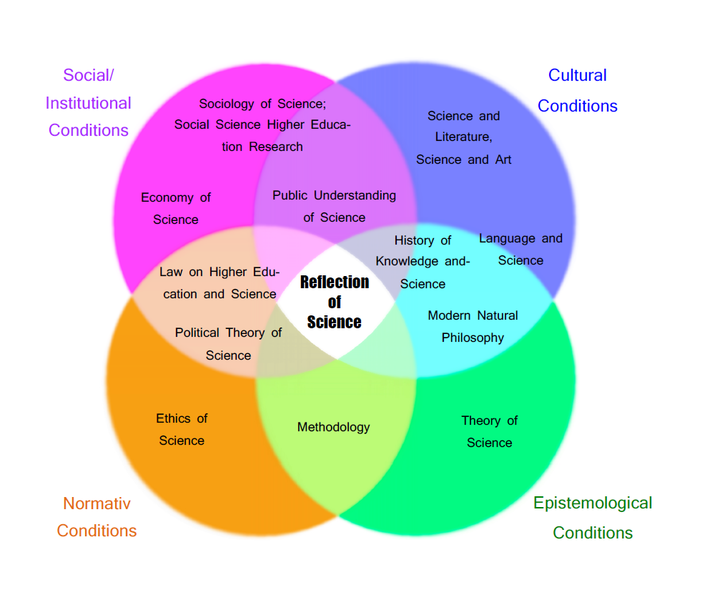The research focus of "Reflection on Science" brings together research from the humanities and social sciences on the social, epistemological, normative, and cultural conditions of science. Participating departments are the Faculty of Philosophy, Economics, and Law.
Reflection of science: The challenge of the grand challenges
Across the globe, high expectations are invested in future scientific knowledge for solving most of the grand challenges of the 21st century, whether it is climate change, world nutrition, energy supply, health, extinction of species or water shortage. To cope with these problems, a strong and innovative research is considered indispensable. But the successful development, mediation and application of scientific knowledge in itself poses a grand challenge. The sciences react to the steadily increasing flood of new knowledge by means of disciplinary differentiation: An increasingly fine-grained definition of scientific specialization is supposed to enable researchers to keep pace with the flow of new discoveries in their respective fields. The high degree of specialization often poses a problem for potential users of knowledge. The practical problems do not adhere to the boundaries of classification within our system of science. Thus, there is the call for transdisciplinary research in which knowledge production is supposed to be as closely connected to the context of application as possible. At the same time, however, the primarily epistemological study of general and fundamental causal connections and mechanisms is not to be ignored. The tension facing researchers is in many cases intensified by an increasing economization, politicization, and medialization of the sciences. The capacity of the sciences, their ability to comment on more and more complex issues, increases the public expectations toward science to provide quick answers to pressing questions. In a politicized climate, the resulting pressure can even lead to a credibility crisis of science, as can now be observed in the discussion on climate change in the US. But also in other areas that are subject to controversial assessments science repeatedly has to fight for its credibility. This is often closely connected to its ability of contributing to solutions of future problems because this requires a socially robust public recognition of scientific expertise. The mediation of knowledge and skills as well as other complex tasks of higher education institutions are also part of the challenges of the science system. Developments such as the increasing academization of education, the growing diversity among students or the advent of conceptualizing study as lifelong learning indicate a broader understanding of contexts of science and point to transformations that concern society as a whole.
Science does not explain itself
While the sciences successfully enter ever more areas of life, they do not automatically ensure the preconditions for their own success and also do not explain them. Even their greatest achievements do not illuminate the conditions of their success. But also in cases of failure, e.g., when social recognition of scientific knowledge is not achieved, science does not explain itself. The required understanding can only be achieved by research reflecting on science itself. As a social, cultural and cognitive phenomenon, science is subject to research in the social sciences and humanities. By involving humanities and social science disciplines, research reflecting on science focuses on the diverse conditions underlying the production, distribution, understanding and application of scientific knowledge. Leibniz Universität Hannover has become a center for this research. Since science, as indicated above, is a social field that creates societal consequences of its own, reflection of science is also a contribution to a diagnosis of the present.
Reflection of science - An interdisciplinary field of research
The sciences are subject to social, cultural, epistemological and normative preconditions which themselves are, in general, outside of their own range of observation or impact. Different subfields in the reflection of science cooperate in the study of these contextual conditions






